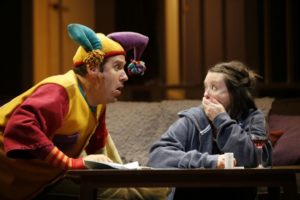Searching for parking in Fernwood in a pitch-black stormy November night has got to be some kind of metaphor for life. By the time I arrived in my seat at the Belfry Theatre to see Mustard on Thursday night, I was soaked, petulant due to vague parking signs, profusely perspiring, and thankful to forget it all with the powerful portrayals of realism in this play, which stretches both the dark and benevolent paths of the human heart in many directions.

UBC Theatre graduate Heidi Damayo’s portrayal of Thai was relatable in its angst, desperation, and—at times—humorous isolation, yet it never crossed into cliché as characters like hers all too often do in modern-day theatre. This incredible lineup of actors and actresses had no weak link, but Damayo’s performance was a highlight. The intensity of her character was foiled beautifully by Andrew McNee, who played the title character with quirky, odd idiosyncrasies that illustrated the sadness in learning to let go of childhood in a way that wasn’t depressing to watch. At times, he was the definition of comic relief, and at others he stepped up to the plate when drama came knocking. The joyful oddities he brought to the stage were comparable to something Johnny Depp might pull out of his sleeve.
The sound engineering was realistic; the set was an incredible take on detailed minimalistic realism.
At its heart, this play dealt with the things people love not to deal with: how grief can warp our perception of memories and those we love (or perhaps love to hate); the fine line between mental health cultivating the mind and hindering it; how adulthood can crush childhood dreams. Most importantly, Mustard addresses the complex parent-child relationship, and does so with fierce elegance, heartbreak, and tinges of graphic horror.
Mustard
Various times, until November 25
Various prices, Belfry Theatre
belfry.ca
